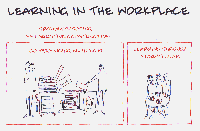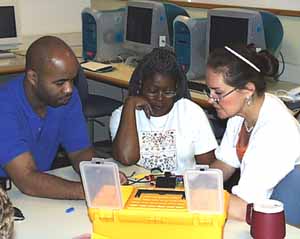| LIFE IS AN EXPLORATION (AND FUN)
SCIENCE IS AN EXPLORATION (AND FUN)
EDUCATION SHOULD BE ...
AN EXPLORATION, AND FUN
Among the great ironies of our culture is that science, a fundamentally open-ended and exploratory activity, is frequently taught so much as a body of"facts"that many students become estranged from science, and most are deprived of an opportunity to have experiences which strengthen and reinforce their own inclination to experiment, question, and explore ... both the world outside and themselves. Materials presented here are aimed at finding ways to make science education, and education in general, more exploratory, and more fun.
|
| I believe that education must be conceived as a continuing reconstruction of experience, that the process and the goal of education are the same thing.
I believe that education, therefore, is a process of living and not a preparation for future living.
-- John Dewey,My Pedagogic Creed
The teacher is not only a communicator but a model. To communicate knowledge and to provide a model of competence, the teacher must be free to teach and learn
--Jerome Bruner,The Process of Education
|
|
K-12 Resources and Discussions
- Hands-on Activities for Teaching Biology to High School or Middle School Student- Ingrid Waldron, a member of the Biology Department at the University of Pennsylvania, in collaboration with both colleagues at Penn and K-12 teachers, developed a set of hands-on biology activities which include topics such as"Studying Our Senses"with jelly beans,"Dragon Genetics,"and"Moldy Jell-O."
- Off the Shelf Chemistry- Bob Farber, a chemistry teacher at Central High School in Philadelphia, PA, developed a set of 18 chemistry activities for high school students, using consumer products for experiments and not requiring a lab and specialized equipment.
- Serendip hostsWorkshops for High School Teachers, ranging from one day to two week hands-on seminars on teaching with technology, teaching science across the curriculum, and bridging the two culture gap.
- Serendip's Togo Connection- Susan White, Associate Professor and Chair of the Chemistry Department at Bryn Mawr College, worked with the Peace Corps in the West African nation of Togo from 1978 to 1981, teaching physical sciences in public high schools. During subsequent visits, she has talked with teachers, school administrators, and government officials about how Americans and Togolese might work together to enhance educational opportunities internationally. Materials presented here (seedirectory) are aimed at developing ways to bring American and Togolese educators and students closer together.
- Mind and Body: RenéDescartes to William James- Robert H. Wozniak, Professor of Psychology at Bryn Mawr College, developed this web exhibit, modified from the Catalogue Accompanying an Exhibition of Books from the Collections of the National Library of Medicine, 1992. Also available in Spanish.
- A Hands-On Interactive Approach to HTML- Creating web pages is easy to begin learning, and to go on learning, in a hands-on, exploratory, interactive way, emblematic of the web itself and the kinds of new directions it makes available for education.
- Many interactive exhibitson Serendip are in the Playground section, includingPrisoners' Dilemma,Sierpinski's Triangle, andSimple Networks, Simple Rules.Time to Thinkis a research lab experiment which uses Serendip to measure simple reaction times, as well as reaction times in a number of increasingly complex"thinking"tasks. Explore, learn and enjoy.
- Brain Matters, A question and answer forum for K-12 students
Pedagogical Discussions
We think we learn from teachers, and we sometimes do. But the teachers are not always to be found in school, or in great laboratories. Sometimes what we learn depends on our own powers of insight. Moreover, our teachers may be hidden, even the greatest teacher.
--Loren Eiseley,"The Hidden Teacher"inThe Star Thrower
A manual? Give me a break! Let me get in there and muck around and try various things and see what happens.
-- John Seely Brown,"Learning, Working, and Playing in the Digital Age"
|
- Empowering Learners: Theory and Practice of Extra-Classroom Teaching, a handbook from Alice Lesnick and her students with issues such as partnering with classroom teachers, how to give effective praise to students, and how to facilitatate discussion about intense topics. - 2005
- Education and Technology: Serendip's Experiences 1994-2004, an exhibit exploring how we use the web, synthesized by Paul Grobstein and Jody Cohen - 2004
- Writing Descartes: I Am, and I Can Think, Therefore ..., an essay by Paul Grobstein and an ongoing experiment in story sharing and story evolution among many colleagues:"The bottom line of the"less wrong"idea is not only that a given story is not"right"but further that it is significant only insofar as it becomes a part of an expanding network of story sharings and alterations, from which all involved get things of value to themselves and for which all involved share responsibility. We are attempting here to both model and illustrate this process, in relation to a set of ideas for which the process is itself an expression."- 2004
- Science In Society in the 21st Century: Interdisciplinarity and Beyond, a talk by Paul Grobstein at Juniata College - 2004
- Emergent Pedagogy: Learning to Enjoy the Uncontrollable and Make it Productive, a working draft of an article which the authors have submitted for publication, by Doug Blank, Kim Cassidy, Anne Dalke and Paul Grobstein - 2004
- Teaching With/On the Web, outline for a talk summarizing emerging pedagogy on the web over 10 years - 2004
- Education as Applied Neurobiology: Students and Teachers As Story Tellers/Listeners/Exchangers, notes for a talk on Changing Pedagogies in Math and Science Education - 2004
- Graduate Idea Forum 2003-04: Explorations of Teaching: What, Why, How and Who, an ongoing discussion with faculty and graduate students, includes bibliography and reading materials
- Story-Telling in (At Least) Three Dimensions: An Exploration of Teaching Reading, Writing, and Beyond, a working draft of an article by Anne Dalke and Paul Grobstein - 2003
- Culture as Disability, a previously published essay by Ray McDermott and Herve Varenne in a new web version with an online forum.
- Science Education: What's it all about?- essays by faculty and students involved in science education, reflecting on what goes right and what doesn't.
- The Scientist/Teacher: A Call to Arms-"The time is ripe for renewed expressions of commitment to the scientist/teacher ideal. The myth of a conflict between teaching and research needs to be destroyed, and for this we need to make renewed efforts to establish our own careers as viable counterexamples."
- Science and Non-Science: Bridging the Two Culture Gap- a discussion with precollege teachers, using C.P. Snow's 1959 essay as a starting point for conversation about how sciences and mathematics are currently handled in the curriculum, and how one might imagine improving it. From theDiversity and Discovery Institute, 2000.
- Introductory Science: Experiments in Bridging Cultures- notes for a talk discussing experiments in teaching over the last decade, with online examples - 2002.
 |
Learning, Working, and Playing in the Digital Age- annotated transcript of a talk by John Seely Brown:"My interest here today is in looking at the notions of learning, working and playing in the digital age and how today's kids—growing up digital—might actually be quite different from what we might first think. But, more particularly, how by stepping back and looking at the forces and trends underlying the digital world, we may have a chance to create a new kind of learning matrix, one that I will call a learning ecology,"1999. |
|
- Serendip Credo on Education and Technology, from theInquiry, Interaction, and Technology program:"Above all, do no harm -- remember that what is even more important than teaching what to think is teaching how to think, how to make better and better sense of the world....", 2000.
- Gathering Web Evidence To Think About Education: every educational issue is both a mirror of and a key influence on aspects of society and culture,and thoughts about such issues are the essential grist for always possible improvements in education; a study by Felicia Lew, 1998.
- Education and Technology- resources, thoughts, forum for thinking about the relation between the two, 1997.
- Additional Resources
Brain and Education
College Faculty Resources and Discussions
- Serendip is the web host for theCenter for Science in Societyat Bryn Mawr College, which sponsorsprograms and discussionsinvolving scientists and non-scientists as well as academics and non-academics, which are essential to continuing explorations of
the natural world and humanity's place in it,
the nature of education,
the generation, synthesis, and evaluation of information,
technology and its potentials,
the relationships among forms of creativity and understanding.
- Faculty art exhibitsare on permanent display on Serendip.
- Structures of Support: Women Negotiating the Corporate Academy, a faculty workshop - 2004
- Mind and Body: RenéDescartes to William James- Robert H. Wozniak, Professor of Psychology at Bryn Mawr College, developed this web exhibit, modified from the Catalogue Accompanying an Exhibition of Books from the Collections of the National Library of Medicine, 1992. Also available in Spanish.
- Exploring All Paths: Collaborative Products and Process, 2000 - notes for a talk by Liz McCormack (Physics), Paul Grobstein (Biology) and Sasha Schwartz (student of Physics) on quantum mechanics, web-based learning, and collaboration, with an interactive exhibit in Richard Feynman's world.
- Many interactive exhibitson Serendip are in the Playground section, including Prisoners' Dilemma, Time to Think, and the Game of Life. Explore, learn and enjoy.
Undergraduate Course Web Sites
- Serendip hostsBryn Mawr College undergraduate courseswhich experiment with pedagogy, are primarily discussion-oriented, have strong, interdisciplinary focus, and utilize web resources. Many include"web papers"that students research and submit for discussion and evaluation, as well as resource links and materials selected by professors. Some examples of courses are Introductory Biology, Neurobiology and Behavior and The Nature of Inquiry: Story Telling and Retelling in the Sciences and Humanities.
- Materials and resources fromshort seminars at Bryn Mawr Collegeinclude topics of wellness and of women's health.
Links to Web Resources by Topic
|



